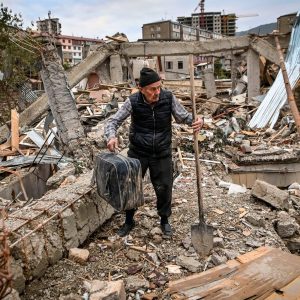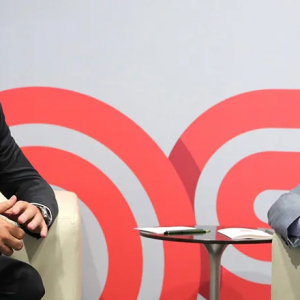Under the United Nations Convention on Genocide, “genocide means any of the following acts committed with intent to destroy, in whole or in part, a national, ethnical, racial or religious group, as such:
- Killing members of the group;
- Causing serious bodily or mental harm to members of the group;
- Deliberately inflicting on the group conditions of life calculated to bring about its physical destruction in whole or in part;
- Imposing measures intended to prevent births within the group;
- Forcibly transferring children of the group to another group.”
On January 26th, 2024, the International Court of Justice (ICJ) released an interim ruling on South Africa’s case against Israel. In bringing the action in December of 2023, South Africa claimed that Israel was—and is still—engaging in acts of genocide against the Palestinian people located in both Gaza and the West Bank.
Ultimately, the ruling presented Israel with six legally binding conditions: Israel must (1) require its army to take measures to prevent acts that may be considered genocidal, (2) allow humanitarian aid to reach the Gaza Strip, (3) punish any and all incitement for genocide, (4) submit monthly reports to the Court regarding the ongoing conflict, (5) take all measures necessary to preserve evidence related to allegations of violations of the Genocide Convention, and (6) take measures to protect Palestinians.
South Africa, which had called primarily for a complete, permanent ceasefire between the opponents, is evidently displeased by the ICJ ruling, with South African President Cyril Ramaphosa stating that “South Africans will not be passive bystanders while crimes are perpetrated upon other people elsewhere.” In response to the initial filing of the case with the Court, Israel publicly accused South Africa of bringing the case as a form of legal aid on behalf of, and even in support of, the Palestinian militant group Hamas, which perpetuated the October 7th attack against Israel that precipitated Israel’s subsequent military response. Although the connection between South Africa and Hamas is hazy and unclear, the proposal raises questions about South Africa’s motives and relationships.
Connections Between South Africa, Palestine, and Hamas
Is there truth to Israel’s allegations as to South Africa’s intimate involvement with Hamas? Is South Africa really bartering on behalf of Hamas, and if so, why? Historically, South Africa has been uninvolved in international conflicts that do not already directly involve their country. More recently, though, in the wake of the fall of the apartheid regime, South Africa has implemented a new plan for the future of the country, one that involves greater participation within the international community.
Just 10 days after the acts of violence committed on October 7th, South African officials held a phone call between the South African Foreign Minister of International Relations and Cooperation, Naledi Pandor, and the leader of Hamas, Ismail Haniyeh. According to Pandor, the conversation in question was simply a show of support for the Palestinian people and a notion of sorrow for the thousands of lives lost in the violence. However, at a time when most, if not all, other countries in the world are condemning the actions of Hamas, it seems strange that the South African minister would feel the need to call up the leader of Hamas directly and that South Africa even has that information to begin with.
Karen Milner, a chairperson of the South African Jewish Board of Deputies, expressed similar sentiments and suspicions. Milner claims that this call has shown that the minister has indeed clearly taken a side and that Pandor’s actions can and will be perceived as a show of support for Hamas. One can’t help but wonder if South Africa feels so inclined to bring this case to the ICJ due to the apartheid atrocities committed in their own country not so long ago. In fact, the African National Congress has often drawn links between the previous apartheid regime and struggles within the Middle East. Pandor has even gone as far as to call for Israel to be designated as an apartheid state due to their treatment of the Palestinians.
As to why South Africa brought the case against Israel instead of another country or international body, or even the Palestinian people themselves, South Africa’s spokesperson Vincent Magwenya has answered, “As a nation that fought and defeated apartheid, we have a particular obligation to stand up for justice and fundamental human rights for all people everywhere.”
It appears that the history of South Africa did play a fundamental role in its decision to bring about the case. This is not to say, however, that the case would not have otherwise been opened by another body or country. Nicaragua, for instance, has attempted to become involved with the case. On Thursday, February 8th, the country filed a petition to join South Africa in its case against Israel, despite the granting of this request in the past being a rare occurrence. The spokesperson for the country claimed that the actions of Israel have violated its own obligations under the genocide convention. To put it simply, Nicaragua wants to join South Africa’s case because Israel is not following the same rules everyone else has to follow under this convention. Moreover, it is clear that many other countries besides Nicaragua have expressed interest in joining the South African side of the case.
Many Questions, Few Answers
Previously, cases around ethnic cleansing, genocide, and crimes against humanity have reached the ICJ only after the conflict has either ended or been resolved. The examples of Germany, Japan, Rwanda, and even South Africa itself all illustrate this pattern. However, this case between Israel and South Africa is markedly different in that accusations have been made and the case is reaching the Court prior to any signs that the conflict is even close to ending.
In fact, the case has reached the Court before many of the numbers regarding casualties, details of military operations, and displacement of citizens and refugees have been finally confirmed. So why is South Africa so eager to bring this case against Israel, and more specifically, what can explain the lack of clarity on details of the reasoning behind the “interim decision”? This question raises further concerns, including the decision’s potential to evolve and adapt as the conflict continues and the difficulty of the ICJ holding a militant group like Hamas responsible for its actions. Israel, as the only official state actor in the conflict, could end up facing punishment alone.
Yet throughout the proceedings, Israel has made it clear that this will not simply be a one-sided case. Its representatives presented their defense to the Court on the second day of trial. Israeli lawyers flipped the situation to make the claim that Israel was instead the victim of genocidal acts on the part of the terrorist group Hamas and that the country was only acting in self-defense. This is undoubtedly an interesting line of argument to take up, but appears provable, after all, given that the Hamas charter states verbatim that the goal of the group is to exterminate the Jews.
That said, despite Israel’s viable defense, holding a militant group such as Hamas legally responsible for its actions seems like an impossible task and has, in fact, never been accomplished before. Thus, the ICJ, if it rules in Israel’s favor, could become the first international governing body to hold an entire terrorist organization responsible for their actions as a matter of criminal law. On the other hand, it is much easier to hold a state like Israel accountable for their actions, but just because something is easier does not mean that it is right.
Unfortunately, there are indications Court too soft on the issue, or perhaps that it did not adequately assess the situation before issuing a decision, especially given previous cases with similar details. For example, when Russia first invaded Ukraine in 2022, Ukraine approached the Court with very similar emergency requests as South Africa has in this case. In that case, the Court issued an immediate ceasefire. Again, in the issue between Serbia and Bosnia in 2015, similar circumstances were presented, yet they led to a completely different result when Serbia was acquitted of genocide accusations. There seems to be no difference between these precedents and this case that would justify such a disparate response.
Perhaps the complexity of the current situation can shed some light on the reasoning as to why the outcome differed from the precedents, but this does not seem likely, since most if not all of the previous conflicts mentioned were and still remain complex issues. Further investigations could attempt to reconcile the distinction; if the case is reevaluated, it will then become necessary to resolve what will be included or considered in the case materials and evidence. In other words, the Court will be faced with the decision of how far back in history will the issue go. It is incredibly difficult to predict what the Court would and would not accept as evidence. What is clear is that the decision would be entirely left up to the Court and its justices, an exercise of judicial power that may not satisfy either side, and is near-certain to upset at least one of the two.
For the time being, it looks as if the situation will most likely remain the same with possible small shifts due to simple daily attack responses. South Africa will remain displeased at the ICJ’s decision to not force Israel to pursue a ceasefire like the country initially demanded. The outcome of this case will prove to be a controversial one, as the entire situation in Gaza has been. One can only hope for a swift end to the conflict and the return of many to safety.
Featured Image Source: Michel Porro/Getty Images






Comments are closed.